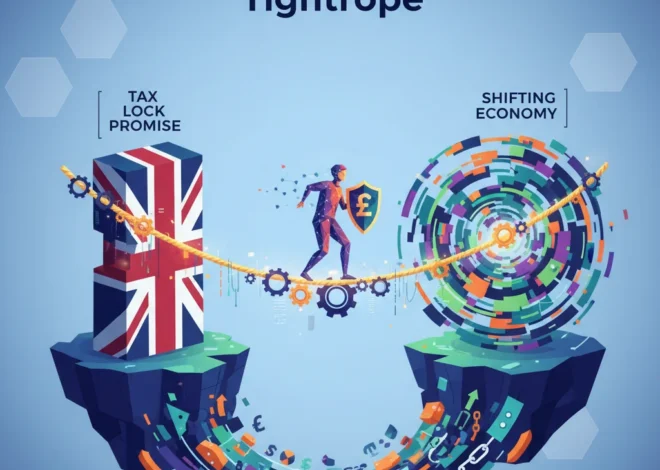
The High Street’s Shadow Economy: Unpacking the Financial Underbelly of Illicit Mini-Marts
On the surface, the proliferation of mini-marts, candy stores, and vape shops across UK high streets might seem like a simple story of entrepreneurial spirit. They offer convenience, a quick stop for essentials, and a splash of colour to urban landscapes. However, a recent bombshell investigation by the BBC has peeled back this veneer, revealing a sophisticated and troubling reality: a sprawling criminal network exploiting these storefronts to facilitate illegal immigration, tax evasion, and the sale of illicit goods. This isn’t just a matter for law enforcement; it’s a profound issue of economic integrity that strikes at the heart of our financial system, with significant implications for investors, business leaders, and the national economy.
This deep dive explores the financial mechanics of this shadow economy, its corrosive effects on legitimate commerce and public finance, and the complex challenges it poses to the modern banking and regulatory landscape. We will dissect how these operations function as a case study in illicit finance and consider the role that financial technology might play in both perpetuating and policing such activities.
The Anatomy of a Criminal Enterprise
The BBC’s undercover reporting uncovered a system brazen in its simplicity and effectiveness. The investigation revealed that these shops are often part of a larger, coordinated network. Individuals, often migrants who have entered the country illegally, are offered a seemingly straightforward deal: a place to live (usually above the shop), a job, and food, in exchange for working long hours for little to no official pay. The business model hinges on two primary streams of illicit revenue: the sale of illegal, high-strength vapes and non-duty-paid cigarettes.
Reporters were told how easy it was to generate substantial, untaxed profits. One individual involved in the network claimed it was possible to make “£300-400 a day” from illegal vapes alone, a figure that scales up to well over £100,000 per year per location, entirely off the books (source). This cash-intensive model is the lifeblood of the operation, allowing the network to bypass the formal financial system, avoid taxes, and launder money with relative ease. The use of undocumented labor further severs ties to the legitimate economy, eliminating payroll taxes, national insurance contributions, and adherence to minimum wage laws.
This structure represents a textbook example of a shadow enterprise—a business operating outside the purview of the state, creating a closed-loop system where illicitly sourced goods are sold by an illegal workforce to generate untraceable cash profits. Understanding this model is crucial for anyone involved in finance, from retail investors to institutional banking compliance officers.
Beyond the Cockpit: Deconstructing the UK-Turkey Fighter Jet Deal and Its Economic Shockwaves
The Financial Plumbing of the Shadow Economy
At its core, this criminal network thrives on the weaknesses and loopholes within our economic framework. It is a direct assault on the principles of fair competition, taxation, and financial transparency that underpin a healthy economy. The core of the problem lies in the untraceable nature of physical cash, which allows these enterprises to operate in a financial black box.
To fully grasp the economic distortion at play, it’s useful to compare the financial model of a legitimate mini-mart with its shadow counterpart.
| Financial Aspect | Legitimate Business Model | Shadow Economy Model |
|---|---|---|
| Revenue Sources | Sale of legal, duty-paid goods; transactions often via card (traceable). | Sale of illegal vapes/cigarettes; primarily cash-based (untraceable). |
| Cost of Goods Sold | Sourced from legitimate wholesalers; VAT and import duties paid. | Sourced from black market; no VAT or duties paid, significantly lower cost. |
| Labor Costs | Employees on official payroll; minimum wage, NI, and income tax paid. | Undocumented workers paid “in-kind” or with minimal cash; no payroll taxes. |
| Tax Liability | Corporation tax, business rates, VAT, and payroll taxes are declared and paid. | Virtually zero. All profits are concealed from tax authorities. |
| Banking & Finance | Regular use of business bank accounts, creating a clear financial audit trail. | Avoidance of the formal banking system; cash is hoarded or laundered. |
This comparison starkly illustrates the immense, unfair advantage held by the shadow enterprise. By evading every form of taxation and regulation, their profit margins are artificially inflated, allowing them to undercut legitimate competitors who play by the rules. The accumulated cash presents a classic money laundering challenge for the banking sector. While these small shops may seem insignificant, a network of hundreds could be generating tens of millions in untaxed, illicit revenue, which must then be integrated into the legitimate financial system or used to fund further criminal activity.
The Macroeconomic Ripple Effect: Beyond the High Street
The impact of these networks extends far beyond the individual storefronts. They create powerful and damaging ripples that affect the broader economy, impacting everything from public finance to private investing.
Impact on Public Finance and the Economy
The most direct consequence is the staggering loss of tax revenue. Every pound of profit that goes undeclared is a pound lost to the Treasury—money that would otherwise fund public services like healthcare, infrastructure, and education. The UK’s tax gap—the difference between tax owed and tax collected—was estimated at £36 billion in 2021-22. The activities uncovered by the BBC are a significant contributor to this gap. From an economics perspective, the proliferation of the shadow economy distorts key indicators like GDP, as a growing portion of economic activity goes unrecorded. This can lead to flawed policy decisions based on incomplete data.
Risks for Investors and Business Leaders
For those involved in investing, particularly in commercial real estate, this phenomenon presents a tangible risk. A tenant running an illegal operation can lead to property seizure, legal liabilities, and a decline in property value. It underscores the critical importance of rigorous due diligence. For business leaders, especially those in the retail sector, these illicit shops represent a corrosive form of competition. Legitimate businesses, whose stock market valuations depend on predictable revenue and margins, cannot compete on a level playing field against entities with virtually no tax or labor costs. This can lead to the closure of legitimate small businesses and put pressure on larger retail chains, ultimately harming local economies and reducing consumer choice.
Can Financial Technology Provide a Solution?
While technology can be exploited, it also offers powerful tools to combat these shadow networks. The world of fintech is at the forefront of this battle, developing solutions that could enhance transparency and make illicit finance more difficult.
The push towards digital payments is a key factor. A less-cash-reliant economy inherently creates a more robust digital audit trail, making it harder for businesses to hide transactions. Advanced financial technology platforms that integrate payment processing with real-time tax reporting could one day automate compliance, closing the loopholes exploited by these networks.
Furthermore, technologies like blockchain, often discussed in the context of cryptocurrency trading, have profound implications for supply chain management. A secure, immutable ledger could be used to track goods like vapes and tobacco from the point of manufacture to the point of sale, making it nearly impossible to introduce counterfeit or non-duty-paid products into the legitimate market. In the banking sector, AI-powered AML systems are becoming increasingly adept at identifying suspicious patterns, such as large, unstructured cash deposits that might signal the laundering of profits from operations like these.
However, technology is a double-edged sword. The same cryptocurrencies and decentralized finance (DeFi) platforms that offer transparency can also be exploited by criminals for money laundering if not properly regulated. The ultimate solution will require a synergy of technological innovation, robust enforcement, and sound economic policy.
The Pet Economy Paradox: Why Soaring Vet Bills Are a Critical Indicator for the Modern Investor
Conclusion: A Call for Economic Vigilance
The BBC’s investigation into the UK’s mini-mart crime network is more than a crime story; it is a critical exposé on the mechanics of the modern shadow economy. It reveals a system that exploits human vulnerability and regulatory gaps to undermine our financial infrastructure. For professionals in finance, investing, and economics, it serves as a powerful case study on the pervasive nature of financial crime and its tangible impact on market fairness, public revenue, and economic stability.
Addressing this challenge requires a multi-faceted approach. It demands stronger enforcement from authorities, greater due diligence from investors and landlords, and continued innovation from the financial technology sector to build a more transparent economic ecosystem. As long as there are avenues to exploit, the shadow economy will persist, reminding us that the integrity of our high streets is inextricably linked to the integrity of our entire financial system.


